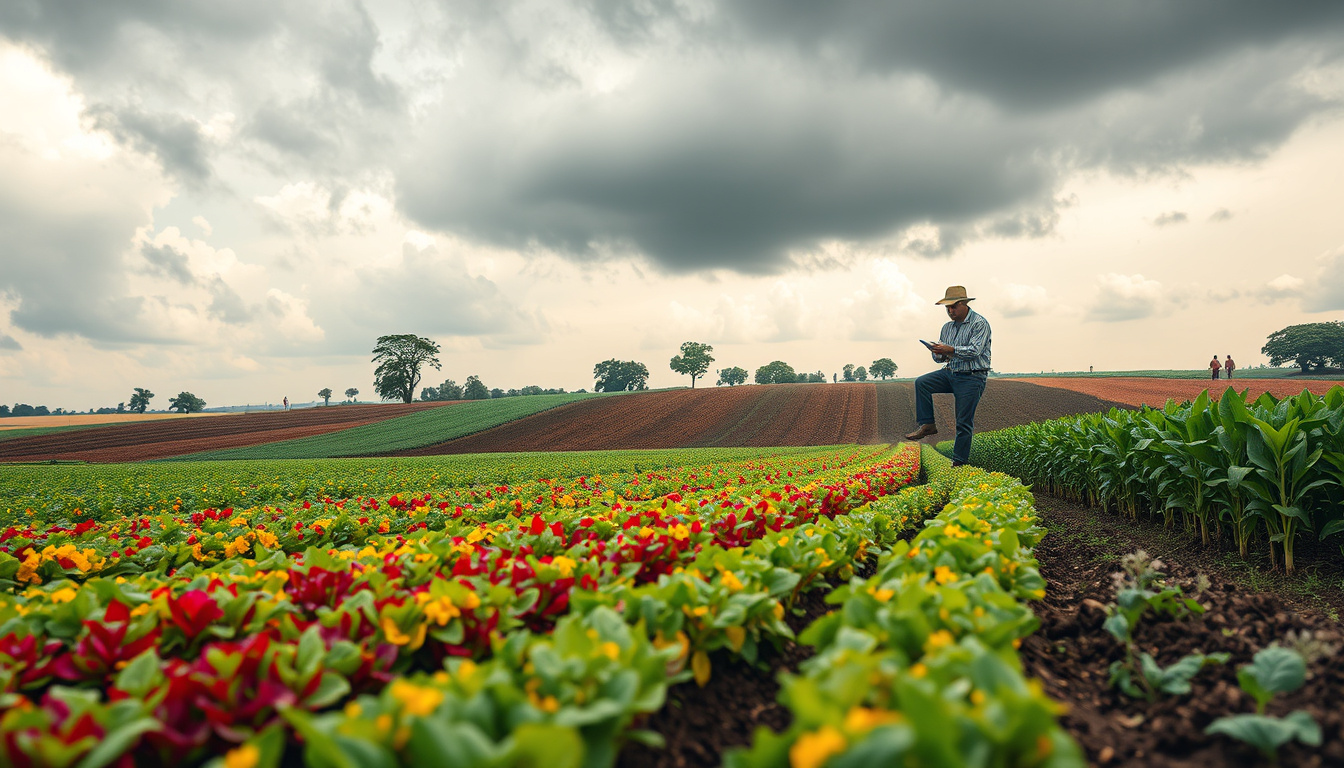The Environmental Impact of Organic Farming

As the global agriculture sector faces increasing scrutiny over its sustainability practices, the environmental impact of organic farming has emerged as a vital topic of discussion. Organic farming, which emphasizes the use of natural processes and materials, aims not only to produce food but to do so in a manner that is harmonious with the environment.
In this article, we will delve into the various organic farming practices, explore the environmental benefits it offers, discuss the challenges and limitations that come with these methods, and finally, consider the future of organic farming within the broader context of sustainable agriculture.
With the planet's health at stake, understanding the environmental impact of organic farming is crucial for consumers, farmers, and policymakers alike.

Ideas to Consider
- Organic farming promotes biodiversity by reducing chemical usage.
- Soil quality is significantly enhanced through organic farming practices.
- Organic farming helps mitigate climate change by lowering greenhouse gas emissions.
- Challenges such as higher costs and lower yields persist in organic farming.
- The future of organic farming is crucial for sustainable agricultural practices.
Understanding Organic Farming Practices
Organic farming has gained popularity as a sustainable alternative to conventional agricultural methods, primarily due to its profound environmental benefits. Understanding organic farming practices reveals how they contribute to the preservation of ecosystems, enhancement of soil health, and reduction of chemical runoff. By avoiding synthetic fertilizers and pesticides, organic farming minimizes pollution and the harmful effects of chemicals on biodiversity.
Additionally, organic farming techniques, such as crop rotation and composting, promote soil fertility and maintain a healthy balance of microorganisms. These practices are essential in mitigating climate change, as they help sequester carbon dioxide in the soil. Thus, the environmental impact of organic farming is a critical aspect that underscores the importance of supporting sustainable agriculture, as it fosters a healthier planet and a more resilient agricultural system.
Environmental Benefits of Organic Farming
Organic farming is often hailed as a beacon of sustainability in agriculture, and for good reason.
The environmental impact of organic farming goes beyond merely avoiding synthetic pesticides and fertilizers; it encompasses a holistic approach to preserving ecosystems, enhancing biodiversity, and reducing environmental pollution. One of the most significant benefits is the improved soil health that organic practices promote.
By utilizing crop rotations, cover crops, and organic compost, farmers can enhance soil fertility and structure, which leads to better water retention and reduced erosion. Furthermore, organic farms often foster a rich diversity of plant and animal life, creating habitats that support various species, thus contributing to healthier ecosystems.
Additionally, organic farming significantly reduces greenhouse gas emissions by relying on natural processes rather than fossil-fuel-intensive inputs. Through these practices, the environmental impact of organic farming demonstrates its potential to combat climate change, protect wildlife, and sustain the earth's resources for future generations.
'The greatest threat to our planet is the belief that someone else will save it.' – Robert Swan

Challenges and Limitations of Organic Farming
Organic farming has gained significant attention in recent years, often praised for its potential benefits to the environment and human health. However, it is essential to consider the challenges and limitations of organic farming, particularly in relation to the environmental impact of organic farming practices. One of the main issues is that organic farming may require more land compared to conventional farming methods, as organic yields are often lower. This can lead to deforestation and habitat destruction if not managed carefully.
Additionally, while organic farms typically avoid synthetic pesticides and fertilizers, they may still experience pest pressures that can be managed only with organic-approved substances, which may have their own environmental footprint. Furthermore, the transition phase from conventional to organic farming can result in temporary increases in soil erosion and decreased crop productivity. As the industry continues to grow, understanding these challenges is crucial for promoting sustainable practices that truly enhance the environmental impact of organic farming.
Future of Organic Farming in Sustainable Agriculture
The future of organic farming in sustainable agriculture is promising, driven by the increasing awareness of the environmental impact of organic farming. As more consumers seek food options that are not only healthy but also environmentally friendly, organic farming presents a viable solution. With its emphasis on natural fertilizers, crop rotation, and biodiversity, organic farming minimizes the use of harmful chemicals, promoting sustainable land management practices.
This shift is essential in mitigating issues like soil degradation and water pollution, fostering a healthier ecosystem. Furthermore, advancements in organic farming techniques are paving the way for higher yields and greater resilience against climate change, ensuring that this agricultural method can meet the rising global food demand while prioritizing environmental stewardship.
As we look toward the future, the role of organic farming in sustainable agriculture will become increasingly integral, aligning with global efforts to combat climate change and promote ecological balance.
Frequently Asked Questions
What are the main practices involved in organic farming?
Organic farming practices include crop rotation, cover cropping, organic fertilizers, composting, and the use of biological pest control instead of synthetic pesticides. These practices aim to promote soil health, biodiversity, and ecosystem sustainability.
What environmental benefits does organic farming provide?
Organic farming offers several environmental benefits, such as improved soil quality, enhanced biodiversity, reduced pollution from chemicals, and better water conservation. It also helps mitigate climate change by sequestering carbon in the soil.
What challenges does organic farming face?
The challenges of organic farming include higher production costs, lower yields compared to conventional farming, limited availability of organic inputs, and difficulties in pest and weed management without synthetic chemicals. Additionally, there may be market access issues for organic farmers.
How does organic farming contribute to sustainable agriculture?
Organic farming contributes to sustainable agriculture by promoting practices that work in harmony with nature, reducing dependence on non-renewable resources, and enhancing the resilience of farming systems against climate change and environmental degradation.
What does the future hold for organic farming?
The future of organic farming appears promising, with increasing consumer demand for organic products, ongoing research and innovation in organic techniques, and a growing recognition of its role in sustainable food production systems. However, continued efforts are needed to address challenges and improve scalability.
We publish a quarterly magazine available in IOS, Android and Web reader. Stories and articles curated from amazing people all around the world.





